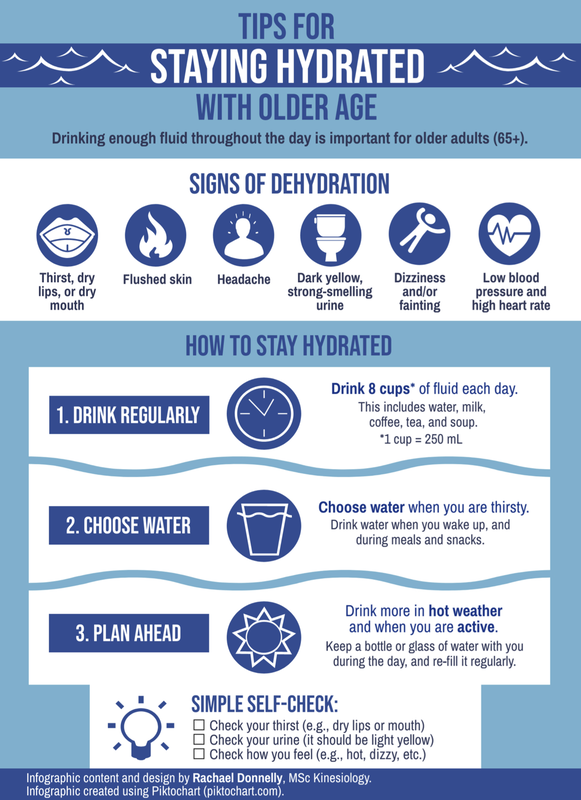This is a companion article to Heat Safety and Air Quality
Water Intake and Dehydration (3/9/2021; 5/7/2022; 7/24/2022)
Download 3-Page Version: PDF / 2-Page Version: DOCX & PDF
Submitted by Emily Lord from Community Life Foundation
Dehydration is extremely common among adults aged 65 and older.
How much water do I actually need?
Download 3-Page Version: PDF / 2-Page Version: DOCX & PDF
Submitted by Emily Lord from Community Life Foundation
Dehydration is extremely common among adults aged 65 and older.
How much water do I actually need?
- Experts generally recommend that adults drink about 8 cups or 64 ounces a day.
- Recent research has suggested that water intake should correlate to weight, height, age, and activity output.
- Check with your doctor to confirm how much water you should be drinking
- Little or no urination
- Dark or amber-colored or strong-smelling urine
- Extreme thirst
- Dry skin that stays folded when pinched
- Irritability, dizziness, or confusion
- Low blood pressure
- Rapid breathing and heartbeat
- Weak pulse
- Cold hands and feet
5 Ideas for Seniors to Drink More Water
Having trouble meeting your daily goal for water intake? It’s easy to get caught up in the momentum of daily life and forget to stay hydrated. Below are some tips to help older adults stay hydrated and incorporate more water into their daily routine:
Having trouble meeting your daily goal for water intake? It’s easy to get caught up in the momentum of daily life and forget to stay hydrated. Below are some tips to help older adults stay hydrated and incorporate more water into their daily routine:
- Keep water easily accessible: Keep a pitcher of water nearby on a table or carry a water bottle when going out. The more convenient it is to drink water, the more likely you will be to do it.
- Incorporate other beverages: While water is always the best choice, you can switch things up with juices, coffee, sparkling water or even soup broth.
- Eat your water: Many foods are a great source of water. Popsicles, watermelon, celery, strawberries, and tomatoes are water-rich foods that are also healthy!
- Download an app: If you are tech-savvy consider downloading one of the many apps available to help track your water intake as well as provide you with helpful reminders to stay hydrated throughout the day.
- Experiment with fruit: Adding different fruits to your pitcher of water can help change the flavor in a subtle way that makes it more satisfying. Experiment with different flavors and find what works for you.
RESOURCES
Caregiver Training Video with Slides
Hydration/Dehydration - To drink or NOT to drink? That is NOT the question!
Fluid intake is important for people of all ages and dehydration in the elderly is especially crucial issue. When older adults become dehydrated, they may experience muscle cramps, disorientation, confusion and many other threatening healthcare conditions. If they are severely dehydrated, they may go into shock, which can be life threatening. In this video training, you will learn more about the importance of hydration and strategies to increase fluid intake for yourself and the people you care for.
Presented by Maria L. Wellisch, R.N., LNFA
https://training.mmlearn.org/caregiver-training-videos/dehydration-in-the-elderly
Hydration/Dehydration - To drink or NOT to drink? That is NOT the question!
Fluid intake is important for people of all ages and dehydration in the elderly is especially crucial issue. When older adults become dehydrated, they may experience muscle cramps, disorientation, confusion and many other threatening healthcare conditions. If they are severely dehydrated, they may go into shock, which can be life threatening. In this video training, you will learn more about the importance of hydration and strategies to increase fluid intake for yourself and the people you care for.
Presented by Maria L. Wellisch, R.N., LNFA
https://training.mmlearn.org/caregiver-training-videos/dehydration-in-the-elderly
Chronic illnesses caused by heat stress and dehydration
Medical researchers are starting to find links between sustained heat exposure and chronic health conditions ranging from diabetes to kidney stones, cardiovascular disease and even obesity.
Fat production is the body’s reaction to—and anticipation of—dehydration.
https://time.com/6196564/climate-change-obesity-long-term-health-impacts/
Medical researchers are starting to find links between sustained heat exposure and chronic health conditions ranging from diabetes to kidney stones, cardiovascular disease and even obesity.
Fat production is the body’s reaction to—and anticipation of—dehydration.
https://time.com/6196564/climate-change-obesity-long-term-health-impacts/

 RSS Feed
RSS Feed